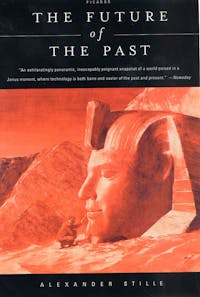The Future of the Past
 Download image
Download image
ISBN10: 0312420943
ISBN13: 9780312420949
Trade Paperback
368 Pages
$24.00
CA$26.99
A New York Times Notable Book
An American Library Association Notable Book
A Reference and User Services Association Notable Book
Space radar, infrared photography, carbon dating, DNA analysis, microfilm, digital databases—we have better technology than ever before for studying and perserving the past. And yet the by-products of technology threaten to destroy—in one or two generations—monuments, works of art, and ways of life that have survived thousands of years of hardship and war. This paradox is central to our age. We can access infinite amounts of information on the Internet, but the historical context of it all is escaping us. Globalization may eventually benefit countries around the world; it will also, almost certainly, lead to the disappearance of hundreds of regional dialects, languages, and whole societies.
In The Future of the Past, Alexander Stille takes us on tour of the past as it exists today and weighs its prospects for tomorrow, from China to Somalia to Washington, D.C. Through incisive portraits of their protagonists, he describes high-tech struggles to save the Great Sphinx and the Ganges; efforts to perserve Latin within the Vatican; the digital glut inside the National Archives, which may have lost more information in the information age than ever before; and an oral culture threatened by the "new" technology of writing. Wherever it takes him, Stille explores not just the past but also our ideas about the past: how they are changing—and how they will have to change if our past is to have a future.
Reviews
Praise for The Future of the Past
"Fascinating . . . deftly written, keenly observed."—The New York Times
"A smart and engaging work . . .You can take your pick of strong essays in The Future of the Past as they unexpectedly engulf you in subjects ranging from pollution of the sacred Ganges to cultural memory and survival in the South Pacific to the political role of spoken poetry in Somalia to . . . the double-edged role of libraries, computerization, and literacy itself in the loss or preservation of history. His book serves as something of a counterpoint, a hopeful sign about the level of discussion possible in American culture"—The New York Times Book Review
"This book is worth reading for its chapter on the Sphinx alone . . . Lively."—Harper's magazine
"An exhilaratingly panoramic, inescapably poignant snapshot of a world poised in a Janus moment, where technology is both bane and savior of the past and present."—Newsday
"[A] fascinating meditation on the ways we remember—and pave over—history."—The Commercial Appeal (Memphis)
"[Stille] never slides into an academic tone. Each chapter moves briskly from a gripping opening scenario to a well-researched contextualization and onto an appropriately sobering concluding meditation . . . remarkable."—South Florida Sun-Sentinel
"Stille is an indefatigable reporter, remarkable especially for his willingness to stray off the beaten path, whether into the complexities of a Latin text or the rivalries among Mogadishu's warlords . . . Stille's book is far more than just a litany of loss and woe. He is passionately interested in why all this is happening, and in the larger patterns that emerge; his eye is keenly trained to pick out the threads that link, say, the death of a lemur and the loss of a manuscript"—Preservation magazine
"[An] Engaging collection of dispatches . . . [with] fluid, thoughtful speculations and scrupulously detailed reporting."—The Washington Post Book World
"Stille is an unusually engaging, affable guide gifted with the novelist's ability to sketch characters and the scholar's capacity to explain ideas without reducing their complexity . . . Stille's travelogue is filled with poignant tales of committed, at time quixotic, individuals who have become guardians of the past by virtue of their own arts of memory."—Los Angeles Times
"Eloquent . . . illuminating and engrossing . . . His investigations provide a fresh, lively, and ultimately wrenching display of a world transforming itself irrevocably . . . Eloquent."—Jennifer Egan, The New York Observer
"A graceful writer, Stille concludes that the Information Age can't seem to preserve much information about its own time, let alone the past."—Booklist
"Stille here takes a thoughtful look at how technology and other forces of modernity may be obliterating our past . . . Sobering and lucid . . . Highly recommended."—Robert J. Andrews, Library Journal
"'You study it, you kill it.' That comment best captures the paradox at the heart of Stille's splendid book: scholars work feverishly to study and preserve precious monuments, rare species and ancient manuscripts, relying on ever more advanced forms of technology in their efforts, while the accelerating rate of technological change industrialization, population growth and pollution threatens to destroy these treasures. Hence, a cycle of preservation and destruction perpetuates itself. Stille, a lovely storyteller, brings to life the passionate and forceful personalities of preservationists, dedicated scholars, bald opportunists, looters and other key players in the world of conservation and preservation. Stille consistently offers a powerful narrative, rich with anecdote, detailed description and lively dialogue. This is a must read for anyone interested in the preservation of our world's decaying treasures."—Publishers Weekly
Reviews from Goodreads
BOOK EXCERPTS
Read an Excerpt
THE FUTURE OF THE PAST
1
The Sphinx--Virtual and Real
SITTING AT A computer terminal in Santa Monica, California, I watched the Great Sphinx of Giza take shape before my eyes as a scholar's careful measurements...


